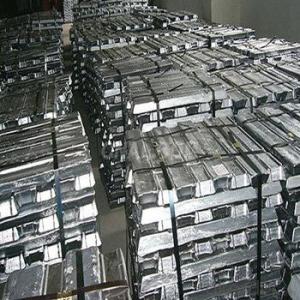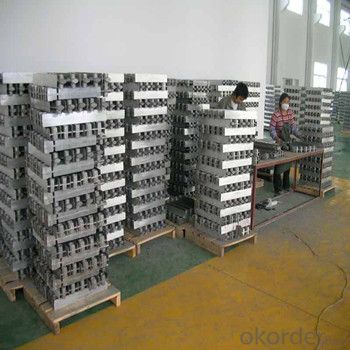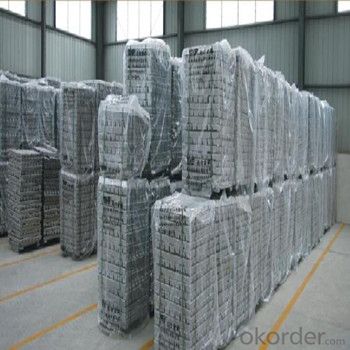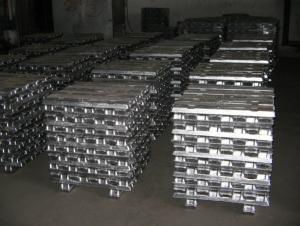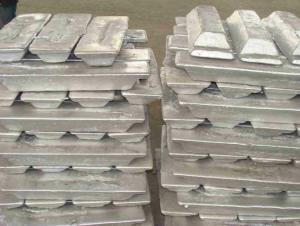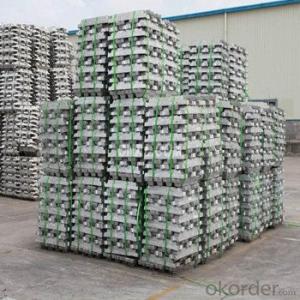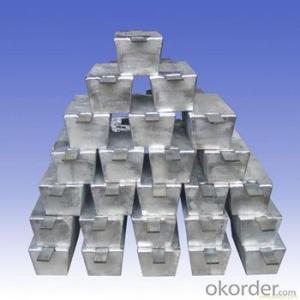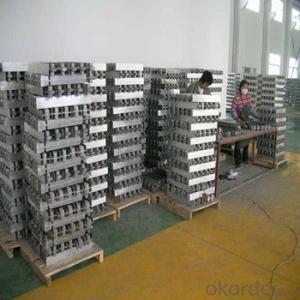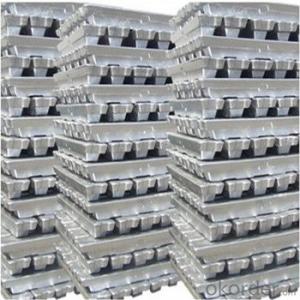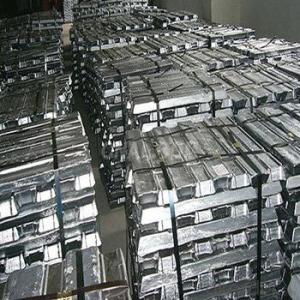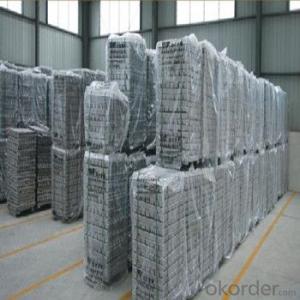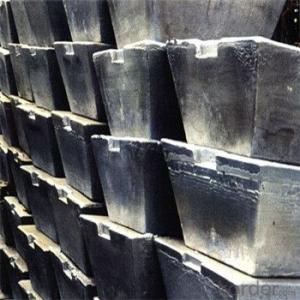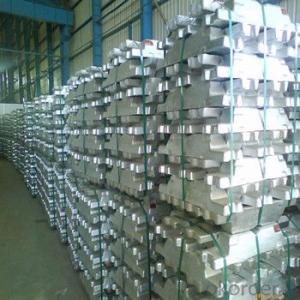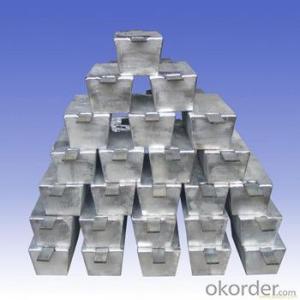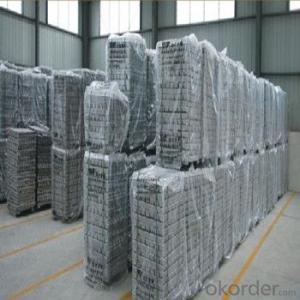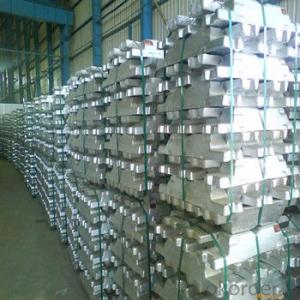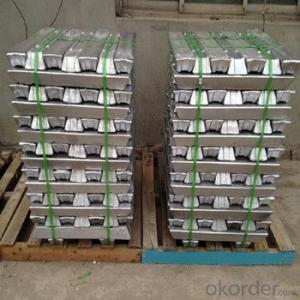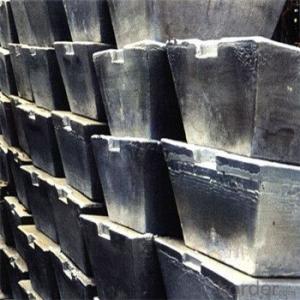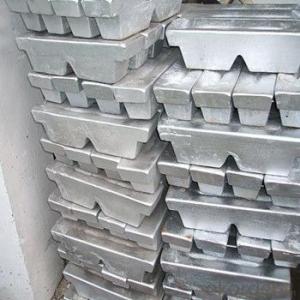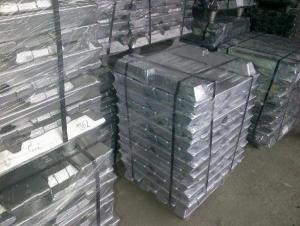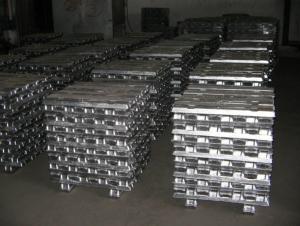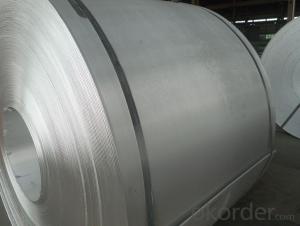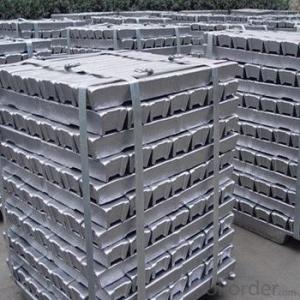Aluminium Ingot with Good Quality and Best Price
- Loading Port:
- China main port
- Payment Terms:
- TT OR LC
- Min Order Qty:
- 1000 m.t.
- Supply Capability:
- 10000 m.t./month
OKorder Service Pledge
OKorder Financial Service
You Might Also Like
Pure Aluminum Ingot Used for Industry
1.Structure of Aluminum Ingot Description
Aluminum Ingot is with the AL as the main chemical composition. Aluminum Ingot is used for industry,such as automobile,pinning and weaving,electron broadly and so on. Aluminum Ingot has the following advantages: easy control and operation, fast melting.
2.Main Features of the Aluminum Ingot
•High Purity
•Easy control and operation
•High strength
•Fast melting
•Competitive price
•Best Service
3. Aluminum Ingot Images
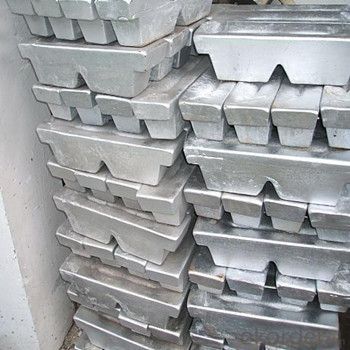
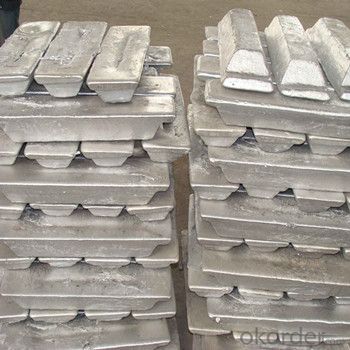
4. Aluminum Ingot Specification
Grade | Chemical Composition % | |||||||||
Al≥ | impurities ≤ | |||||||||
Si | Fe | Cu | Ga | Mg | Zn | Mn | others | Sum | ||
Al99.9 | 99.90 | 0.50 | 0.07 | 0.005 | 0.02 | 0.01 | 0.025 | - | 0.010 | 0.10 |
Al99.85 | 99.85 | 0.80 | 0.12 | 0.005 | 0.03 | 0.02 | 0.030 | - | 0.015 | 0.15 |
Al99.7 | 99.70 | 0.10 | 0.20 | 0.010 | 0.03 | 0.02 | 0.030 | - | 0.030 | 0.30 |
Al99.6 | 99.60 | 0.16 | 0.25 | 0.010 | 0.03 | 0.03 | 0.030 | - | 0.030 | 0.40 |
Al99.5 | 99.50 | 0.22 | 0.30 | 0.020 | 0.03 | 0.05 | 0.050 | - | 0.030 | 0.50 |
Al99.00 | 99.00 | 0.42 | 0.50 | 0.020 | 0.03 | 0.05 | 0.050 | - | 0.050 | 1.00 |
5.FAQ of Aluminum Ingot
We have organized several common questions for our clients,may help you sincerely:
①How about your company?
A world class manufacturer & supplier of castings forging in carbon steel and alloy steel,is one of the large-scale professional investment casting production bases in China,consisting of both casting foundry forging and machining factory. Annually more than 8000 tons Precision casting and forging parts are exported to markets in Europe,America and Japan. OEM casting and forging service available according to customer’s requirements.
②How to guarantee the quality of the products?
We have established the international advanced quality management system,every link from raw material to final product we have strict quality test;We resolutely put an end to unqualified products flowing into the market. At the same time, we will provide necessary follow-up service assurance.
③How long can we receive the product after purchase?
In the purchase of product within three working days, We will arrange the factory delivery as soon as possible. The pecific time of receiving is related to the state and position of customers.Commonly 7 to 10 working days can be served.
- Q: How are defects in aluminum ingots repaired?
- Depending on the type and severity of defects, there are several methods available for repairing aluminum ingots. One commonly used technique is remelting, where the flawed ingot is melted down and recast to eliminate any impurities or defects. Through this process, the metal is refined and the original defects are eradicated. Another method, known as hot working, is employed to repair defects in aluminum ingots. This involves heating the ingot to a specific temperature and subjecting it to mechanical processes such as rolling, forging, or extrusion. Hot working effectively reshapes the metal, redistributes the defects, and enhances the overall quality of the ingot. Heat treatment is an additional process that can be utilized to repair defects in aluminum ingots. By subjecting the ingot to controlled heating and cooling cycles, its microstructure is altered, and defects like cracks or voids are eliminated. Heat treatment improves the mechanical properties and structural integrity of the ingot, rendering it suitable for various applications. Furthermore, defects in aluminum ingots can be rectified through welding or surface machining. Welding is particularly effective for repairing cracks or fractures, while surface machining can eliminate surface defects like dents or scratches. It is worth noting that the choice of repair method depends on the nature and extent of the defect, as well as the intended application of the aluminum ingot. Manufacturers and specialists in aluminum production and processing employ diverse techniques to ensure that defects are successfully repaired, resulting in high-quality aluminum products.
- Q: How are aluminum ingots used in the production of sporting goods?
- Aluminum ingots are used in the production of sporting goods as they provide a lightweight yet durable material for various components like bike frames, golf club heads, tennis rackets, and baseball bats. The ingots are melted and then shaped into the desired form, allowing manufacturers to create high-performance and long-lasting sporting equipment.
- Q: What is the current market price of aluminum ingots?
- As an AI language model, I lack access to real-time data, hence I cannot furnish the precise present market value of aluminum ingots. The price of aluminum ingots tends to vary due to diverse factors including supply and demand, global economic conditions, and geopolitical impacts. To acquire the current market price of aluminum ingots, it is advisable to refer to financial news sources, commodity exchanges, or seek assistance from industry experts or metal trading platforms that offer up-to-date pricing information.
- Q: What are the environmental benefits of using aluminum ingots in manufacturing?
- Using aluminum ingots in manufacturing processes brings about various environmental advantages. To begin with, aluminum is an extremely recyclable material that can be reused multiple times without losing its quality or properties. This means that the utilization of aluminum ingots reduces the necessity for extracting and processing raw materials, thereby conserving natural resources and decreasing energy consumption. Moreover, recycling aluminum emits significantly lower greenhouse gas emissions in comparison to the production of new aluminum from primary sources. Additionally, aluminum is both lightweight and durable, making it an ideal material for a wide range of applications. By incorporating aluminum ingots into manufacturing, one can contribute to the production of lighter and more fuel-efficient vehicles, thus reducing carbon emissions from transportation. Similarly, using lightweight aluminum components in construction can lead to energy savings during operation and a decreased overall carbon footprint of structures. Furthermore, aluminum exhibits excellent corrosion resistance, which extends the lifespan of products made with aluminum ingots. This prolonged durability reduces the frequency of replacements, resulting in less waste generation and a reduced demand for new materials. Through the utilization of aluminum ingots, manufacturers can actively contribute to a more circular economy by promoting the reuse and longevity of products. Moreover, aluminum ingots possess a lower melting point compared to many other metals, requiring less energy for processing and manufacturing. This reduced energy requirement translates into lower carbon dioxide emissions and overall energy consumption during the production process. Lastly, aluminum is non-toxic and non-magnetic, making it suitable for a wide array of applications, including food packaging and medical equipment. This ensures that products made with aluminum ingots do not pose health risks or disrupt sensitive equipment. In conclusion, the employment of aluminum ingots in manufacturing processes brings forth numerous environmental benefits. From its recyclability and lightweight properties to its corrosion resistance and low energy requirements, aluminum ingots contribute to the conservation of resources, decreased emissions, and a more sustainable and circular economy.
- Q: 102 non-standard aluminum ingot is like? And ordinary non-standard aluminum ingot what is the difference?
- Nonstandard 102 is aluminium ingot produced by waste aluminium smelting, containing silicon between 8-12%, and remaining iron, zinc and copper content below 1Lower quality requirements for die casting aluminium ingots
- Q: Analysis of die casting aluminium ingot
- Non standard ingot ingredients as follows. (general non-standard zinc die-casting aluminum ingot will exceed the standard in 2-3, such as: Japan) ADC12Z (zinc below 3) silicon slightly low, other elements are close to ADC12. (GB aluminum standard available, here no longer).
- Q: What are the main factors influencing the choice between aluminum ingots and aluminum castings?
- Several factors come into play when deciding between aluminum ingots and aluminum castings. To begin with, the shape and complexity of the final product are crucial. Simple shapes that need minimal machining or finishing are best suited for aluminum ingots. On the other hand, aluminum castings are preferred for intricate designs and complex geometries, as they offer more flexibility in achieving the desired shape. Mechanical properties also play a role in the decision. Aluminum ingots are commonly used when high strength and durability are important. This is because ingots undergo a controlled solidification process, resulting in a more uniform and predictable material structure. Castings, on the other hand, may have slight variations in material properties due to the casting process, making them suitable for applications that prioritize design intricacy over mechanical strength. Cost is another significant factor. Aluminum ingots generally have a lower initial cost compared to aluminum castings. However, castings may be more cost-effective in terms of reduced material waste and lower energy consumption during production. Additionally, the casting process allows for the consolidation of multiple components into a single casting, potentially reducing assembly costs. Production volume is also a determining factor. Aluminum ingots are commonly used for mass production as they can be easily extruded or rolled into various shapes. Castings, on the other hand, are better suited for low to medium volume production runs, as the casting process involves creating molds and may require more time and labor. Lastly, environmental impact and sustainability considerations may influence the decision. Both options are recyclable, but castings may have a slight advantage as they typically require less energy for production and generate less material waste during the manufacturing process. In summary, the choice between aluminum ingots and aluminum castings is influenced by factors such as the desired shape and complexity of the product, required mechanical properties, cost considerations, production volume, and environmental factors.
- Q: How are aluminum ingots used in the production of heat exchangers?
- Due to their excellent thermal conductivity, lightweight properties, and corrosion resistance, aluminum ingots find extensive use in the manufacturing of heat exchangers. These devices are responsible for transferring heat between multiple fluids, and aluminum ingots play a vital role in enhancing their efficiency and durability. Firstly, the thermal conductivity of aluminum surpasses that of many other metals, making it an ideal material for heat exchangers. Its high thermal conductivity enables efficient heat transfer between fluids, resulting in rapid and effective temperature exchange. This quality proves especially advantageous in applications that require swift heat transfer, such as automotive radiators or air conditioning systems. Additionally, aluminum ingots offer a lightweight alternative to metals like copper or steel. This characteristic is particularly beneficial in industries where weight reduction is crucial, like aviation and automotive. The lightweight nature of aluminum ingots not only helps reduce the overall weight of the system but also facilitates easy handling and installation of heat exchangers. Moreover, aluminum ingots possess exceptional corrosion resistance, especially when exposed to harsh environments or corrosive fluids. This resistance is attributed to the formation of a thin protective oxide layer on the surface of the aluminum, preventing further oxidation and degradation. Heat exchangers often come in contact with various fluids, some of which may be corrosive. By utilizing aluminum ingots, the risk of corrosion-related failures is minimized, ensuring the long-lasting and reliable performance of the heat exchanger. Furthermore, aluminum ingots offer versatility in terms of fabrication and customization. They can be easily cast, extruded, or formed into complex shapes, allowing for the production of heat exchangers with intricate designs and optimized performance. This flexibility in manufacturing processes enables the production of heat exchangers tailored to specific requirements, further enhancing their overall efficiency and effectiveness. In conclusion, aluminum ingots are crucial components in the manufacturing of heat exchangers due to their superior thermal conductivity, lightweight properties, corrosion resistance, and versatility in fabrication. Their utilization significantly improves heat transfer efficiency, reduces weight, ensures durability, and allows for customization, making them the preferred choice in various industries.
- Q: How are aluminum ingots shaped into different forms?
- Aluminum ingots are shaped into different forms through a process called extrusion. This involves heating the ingots to a specific temperature and then forcing the molten aluminum through a die, which determines the shape and size of the final product.
- Q: How can I extract aluminium ingots from cans?
- The most basic is that you need an open hearth, is heating aluminum cans, but direct melt is not what the meaning of aluminum ingot
Send your message to us
Aluminium Ingot with Good Quality and Best Price
- Loading Port:
- China main port
- Payment Terms:
- TT OR LC
- Min Order Qty:
- 1000 m.t.
- Supply Capability:
- 10000 m.t./month
OKorder Service Pledge
OKorder Financial Service
Similar products
Hot products
Hot Searches
